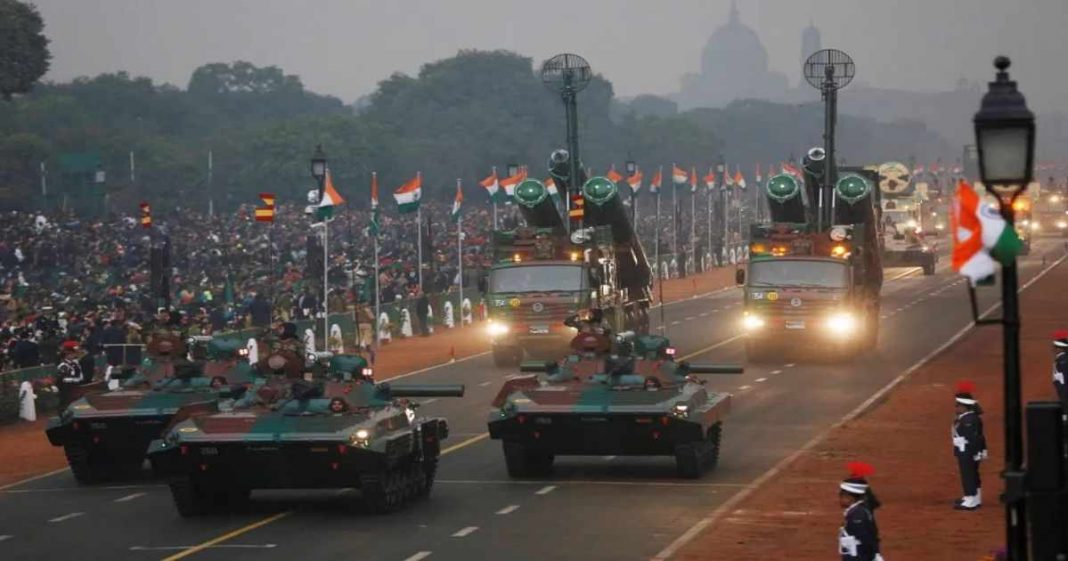The latest data released by global think-tank Stockholm International Peace Research Institute (SIPRI) has listed India as the third biggest military spender in the world, just behind the U.S. and China.
In the time when the United Nations is calling to reduce military expenditure – to divert resources towards the health sector – India’s military expenditure in 2020 was 2 percent higher than in 2019.
India is recently recovering from the devastating second coronavirus wave but still, its defense budget is nearly five times the health budget. We may state with assurance that India’s defense budget was not significantly affected by the pandemic in 2020.
Read more: Actual defence budget of ‘deceptive’ India
Despite draining a huge number of resources in the defense sector, N.C. Asthana in his latest book, National Security and Conventional Arms Race: Spectre of a Nuclear War, has depicted the stark reality that India cannot defeat Pakistan or China militarily due to the absence of a comprehensive ‘national war-fighting strategy’.
Even with the considerable gap in military capabilities, the current Indian government of nationalists and hardliners has continuously fueled warmongering and instigated conflict with Pakistan and China.
This gap in military capability, according to Asthana, is reinforced by the ambiguity in the Indian military and strategic objectives. Asthana suggested to the government that India will be best served by seeking solutions to the security problems by domestically enhancing efforts to find non-military solutions, like diplomacy, rather than spending large amounts on costly arms imports.
Read more: India’s Offensive Military Doctrines Threaten Pakistan Security
He also highlighted the fact that Indian leaders are manipulating animosity with Pakistan for electoral benefits while the politicians are pursuing ‘politics of warmongering’. No doubt, nationalism in India is at an all-time high, as has been shown over the last few years under BJP rule.
The politicians are building a narrative of ‘Indian Invincibility’ and making the efforts for the peaceful solution of disputes futile.
Read more: India: creator of myths and narratives of terror
A worrisome scenario
During any conventional conflict, the risk lies in escalation, which is difficult to manage at the height of any military crisis, particularly where the mantra of warmongering has vitiated the Indian public’s rhetoric.
The current BJP leadership that determines the strategy in terms of war engagement, does not understand nuclear deterrence or military policy. Whereas the military establishment is also unaware and incomprehensible about its nuclear capability and rival’s nuclear redlines.
Read more: India’s nuclear capabilities-a nightmare for South Asia
As India has no effective indigenous defense industry, there is no assurance of war supplies during a crisis and this reality was manifested during the recent Indo-China standoff.
Contemporarily, the unabated rise in India’s defense budget and exaggerated military modernization initiatives have worried analysts who fear that these changes could weaken the traditional military balance associated with preserving strategic stability in South Asia.
Read more:India is allegedly misreporting nuclear weapon stockpile
India has evidently entered a hostile arms race under its hegemonic interests, with increasing militarism. The present position of India’s third most high international military spending and second-largest recipient of weapons is a direct expression of an offensive approach to resolving disputes by force.
Indian policymakers must understand that arms imports will never guarantee a permanent solution to the political problem. Contrary to the Hindutva approach for solving conflicts, the region requires more balance in the arms race via multilateral conventional arms control and reduced military incentives.
Read more: India’s S-400 Air Defence and balance of power in South Asia
A strategic imbalance?
Though the uncontrolled military modernization of India is the prime catalyst for strategic instability in South Asia, the U.S. strategic partnership with India is also undermining fragile traditional conventional parity between India and Pakistan.
The Indo-U.S. defense relations, which ostensibly publicized as the U.S. containment policy against China, seem more of effecting the regional deterrence stability. India is oblivious to the gains of the peace dividend in the region with its desire to play a role of a pawn in the U.S. grand strategy.
Read more: US, India eye growing defense bonds driven by China mistrust
Due to expansionism and inflating nationalism, encouraged by the BJP government, New Delhi is dragged into territorial conflicts with China, Pakistan, and Nepal.
The Modi government attempts to exploit border tensions with neighboring states to avoid Indians’ frustration with actual domestic problems, for example, insufficient management of the pandemic, a stagnant economy, violations of minority rights, and rising prices of raw materials and oil.
Read more: India becomes ‘suicide capital’ of the world, Modi amps military spending
The Indian government might contribute to an armed conflict if it continues to settle significant border disputes with neighbors by military muscles. Therefore, uncontrolled Indian military desires must be restrained, and the strategic balance must be established indiscriminately in order to guarantee regional stability.
The writer is a student of current affairs and political science with a Master’s degree from NUST, Islamabad, Pakistan. He can be reached at zainmoeed7637@yahoo.com. The views expressed in the article are the author’s own and do not reflect the editorial policy of Global Village Space.














